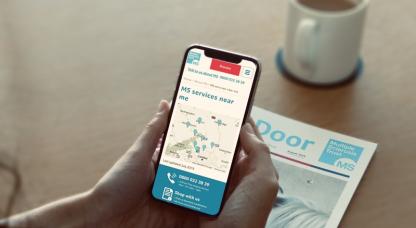Counselling is a type of talking or psychological therapy. It involves talking to a trained therapist about your problems and concerns and can involve exploring ways to manage situations. Counsellors provide a safe and non-judgmental environment to examine your issues and feelings. Some people with multiple sclerosis find counselling can be helpful to develop techniques to cope with the uncertainties and unpredictability of the condition and adapt to any changing symptoms. Counselling may also be of value to those who are close to the person with MS.
A counsellor won't give you advice or tell you what to do, instead they'll help you talk through your issues and try to help you find ways of coping or create an action plan to help you. Counsellors work in different ways, but sessions should be tailored to you the individual. There are various ways counselling can be delivered:
- face-to-face – here you see the counsellor in person, usually at their practice
- individual or group sessions – seeing a counsellor on your own allows you to concentrate on your own feelings in private, whereas group sessions may be helpful if you want to discuss your issues with others who are experiencing similar problems
- telephone – these sessions take place over the phone rather than in person, this can be useful if it is difficult for you to attend face-to-face sessions
- online – this gives you a chance to protect your anonymity and can be useful if you prefer not to speak directly to a counsellor, it can also give you more time to think about what you want to discuss.
It's not unusual to feel anxious before your first session of counselling. It's likely you'll be asked some questions to help your counsellor understand what's worrying you and how your thought processes work. You'll probably be asked why you sought counselling and what you're hoping to gain from it. They'll also ask about your current situation including any issues, your work and home life, and any physical or psychological symptoms you're experiencing. This information will be used to help you in future sessions.
As counselling can involve discussing upsetting or painful issues, it may be difficult at first and it's not unusual to feel worse to begin with. With time, as you begin to move forward, you should begin to feel better.
Counselling is not a 'quick fix' and it's rare for a single session to be enough. Therefore, it's important to build up a trusting relationship with your counsellor where you feel safe and can be honest about your worries. If this isn't the case, and you feel uncomfortable in any way, it's OK to consider looking for another counsellor.
The term counsellor is not yet a protected title so anyone could use the title with little or no training. However, the professional bodies for counsellors the British Association of Counselling and Psychotherapy (BACP) and the UK Council for Psychotherapy (UKCP), regulate their member-practitioners by requiring certain amounts of training and the adherence to codes of ethics and practice. So these organisations can be a good starting point to help you find a suitable counsellor.
A number of MS Therapy Centres offer MS specific counselling services. The Counselling Directory only lists counsellors and psychotherapists who are registered with a recognised professional body. National charities such as Mind and Rethink Mental Illness or local charities such as The Brain Charity can also offer help and support with symptoms such as anxiety and depression.
